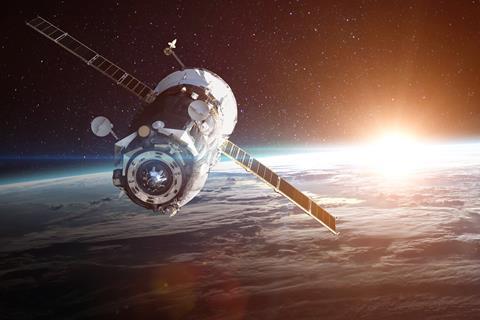- UK invests £18 million in OneWeb satellite plans
- Satellites to support global 5G infrastructure
- UK satellite income reaches £14.8 billion in 2017
The UK Space Agency has invested £18 million in London-based firm OneWeb, which plans to use satellite connectivity to aid 5G technology communications.

The global communication space network championed by OneWeb plans to deliver worldwide internet coverage claimed to be more affordable with faster speeds than ever before.
The scheme is set to launch in seven days’ time with the first 10 satellites of 650 prepared to launch in the first round and more than 900 satellites to follow with ambitions to reach over 2,000 in the next two years.
OneWeb chief executive Adrian Steckel said: “Providing access to people everywhere has been the mission and vision of OneWeb since the very beginning.
“We will be able to realise this vision in part because of important partnerships like this one with the UK Space Agency, ESA and a range of other important partners including our European and Canadian partners.
“Thanks to this support, we will focus together on next generation technologies that will be game changers for realising global 5G connectivity.”
He added: “We are excited about the application of artificial intelligence and machine learning technologies to develop novel automation techniques that could help manage our constellation in future and ensure we do so safely and responsibly so that we can protect space for future generations.”
OneWeb was founded by entrepreneur Greg Wyler whose ambition to launch a ‘mega-constellation’ of an initial 900 satellites orbiting 1200 kilometres high to deliver broadband to unserved regions in a move to connect people everywhere.
With some impressive financial backers including $1 billion from Japan’s media conglomerate SoftBank and a combined $500 million from Qualcomm, Airbus, Virgin, Bharti, Intelsat and Coca Cola.
OneWeb boasts a new generation of satellites; claiming to be ‘smarter, smaller and more affordable with flexibility leveraged from the automotive industry’, the company plans to create a constellation of orbiting satellites to revolutionise the way people communicate and stay connected.
Satellites at the heart of 5G
Satellite technology is set to play a key role in delivering the next-generation 5G access to regions beyond the reach of terrestrial operators.
OneWeb chief commercial officer Vivek Jhamb said without satellite network connections to widen access 5G is not economically or technically feasible.
He said: “5G cannot be fully integrated into society and business the way it is currently imagined”.
OneWeb’s low-earth orbit constellation will operate around 30-times closer to earth than most legacy satellite systems, allowing speeds and latency comparable to fibre or cable.
The satellite constellation will initially offer speeds of more than 500Mb per second with less than 50 milliseconds of latency and is looking to crank those speeds up to 2.5Gb per second with its second generation constellation, which is planned for 2021.
The UK Science Minister Chris Skidmore visited the European Space Agency in the Netherlands, he said: “Fast internet access is something many people take for granted but in many areas of the world connectivity is still hit and miss.
“This new £18m investment will go towards meeting the significant technical challenges of the project, putting the UK at the forefront of cutting-edge research and development.”
Skidmore added: “The commercial potential for a cost effective worldwide telecoms satellite system is huge, and the UK space sector is playing a leading role in delivering it.
“It is made possible by our ongoing commitment to the European Space Agency and our world-leading capabilities in space and telecommunications, which we are supporting through our modern Industrial Strategy.”
Satellites play an increasingly important role in connecting people faster.
The OneWeb sunrise programme will take advantage of cost effective spacecraft launched and manufacturing set to deploy hundreds of satellites with the aim to provide internet connectivity to people and businesses across the world.
OneWeb will initially focus on technologies for the next generation of satellite payloads, ground connections and space debris removal.
Wyler shared the news on Twitter, declaring the new era of communication technology set to “bridge the digital divide”.
Thank you! #Satellite and #5G terrestrial services will work together. I am a big believer in how the two technologies can work together to bridge the #digitaldivide. Exciting things to come!!! :) https://t.co/ffhHVtnBnt
— Greg Wyler (@greg_wyler) February 18, 2019
The launch was originally planned for 20 February however has been delayed until 26 February due to an “anomaly” with the equipment from the Russian rocket carrier used to launch the satellites into space.
The UK Space Agency investment will also support novel automation techniques and artificial intelligence to manage the proposed constellation of spacecraft and its interaction with terrestrial networks to realise global 5G connectivity.
UK leads in telecommunication satellites
The UK space industry is commercially focused with 82% of income from sales to consumers and businesses.
According to Gov.uk the latest industry figures show it has an income of £14.8 billion, employment of 41,900 and exports worth £5.5 billion, which supports a further £300 of UK GDP through the provision of satellite services to other sectors.
Last month Eutelsat Quantum, the first satellite capable of being completely reprogrammed after launch left the UK for final assembly and testing in France.
While, Eutelsat and Airbus signed a new contract last November worth hundreds of millions of pounds that will see components and parts for two further communications satellites assembled in the UK, resulting in six out of seven of the company’s next satellites will be partially built in Britain.
The UK space sector is growing rapidly, employing 42,000 people and playing a major role in the global shift towards the commercialisation of space activities known as ‘new space’.
The UK Space Agency has invested £18 million in London-based firm OneWeb, which plans to use satellite connectivity to aid 5G technology communications.
























No comments yet